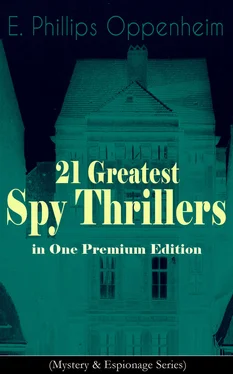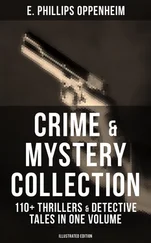“Now, tell me this,” Blute asked, turning slightly towards Charles but keeping a stern watch upon the two intruders. “You said that Fritz is to be trusted. Do you mean that absolutely and entirely?”
“I mean that I trust him as completely,” Charles replied, “as I should you yourself or Miss Grey.”
“The matter, then, is easy,” Blute decided. “Fritz,” he went on, “your master wants to speak to you.”
The two men in uniform started. Fritz appeared from the shadows. There was a somewhat self-conscious smile upon his face. He pointed to the Austrian Nazi as he approached.
“My cousin,” he announced, “Johann Lehrer. He was not so bad until he joined the Gestapo.”
“Fritz!” the other exclaimed.
“Relations, eh?” Blute queried.
“I speak the truth,” Fritz said. “He is the son of my mother’s sister.”
“Family ties, eh?” Blute observed. “Well, that may help. Now listen. Fritz, I take it,” he added, turning to Charles, “is entirely at our disposal for the next four or five days, if necessary?”
“He will do whatever we tell him,” Charles answered. “His trustworthiness is guaranteed.”
“This, then, is what will happen,” Blute announced. “In the first place Fritz will drive us back to the hotel. We shall leave you there,” he went on, touching Mildenhall on the arm. “I hope you will have the night’s sleep you deserve. Fritz and I will drive on to the all-night market. Listen,” he continued, beckoning to the two others, “you can come a little nearer. First, perhaps, it would be better if you took your belts off and got rid of those ugly-looking weapons.”
The two Nazis did as they were bidden. They had lost all fear now and it was obvious that they were intrigued.
“In the all-night market,” Blute went on, “Fritz will purchase for you all the provisions I have mentioned or anything else you prefer. He will then drive back to this place, he will open the door with his revolver in one hand and pass over the provisions to you. He will then lock you up again. He can provide you with journals which he will buy on the way down. Let this be clearly understood. You have your provisions and your drinks and you will be locked up here alone.”
“With the provisions and drinks?” the German repeated in a stentorian voice.
“Precisely.”
“And tobacco?”
“And tobacco,” Blute assented. “Later in the day Fritz will return. This time he may bring you wine and perhaps a can of hot meat. You will be well fed in any case. That is understood. He may be accompanied by men who will do some removal work. That is not for you to notice. Whatever they may appear to be, these men are on our side, and if you appeal to them in any way the chapter will be closed. You will go out of the world probably with a bullet in your body and you will have thrown your lives away to no purpose.”
“We shall not do that,” the German declared. “I am not in love with my job. We will follow the directions. We are listening.”
“For two or three days you may see either this gentleman who is with me or myself at any time. Then the moment will come when we shall leave the city. Fritz here will remain. There will be twenty-four hours’ interval after we have left, during which you will have your usual supply of food and papers, drink and tobacco. At the end of that time Fritz will place in your hands a certain sum of money each.”
“What will that sum be?” the German asked, his blue eyes greedily eager.
“One thousand reichsmarks each.”
The two men were speechless. The Austrian was the first to find words.
“How do we know that we will get it?” he demanded.
“You can surely trust your relative,” Blute replied. “We are giving him his own present separately and we will hand him one thousand reichsmarks for each of you two. You hear that, Fritz?”
“Certainly, sir,” the chauffeur answered. “I can tell you both,” he went on. “One of you I don’t know but the other is my cousin and he knows very well that I have been an honest man all my life and always kept my word. These gentlemen will keep theirs. I know that much about them. They will give me the thousand reichsmarks for each of you and I will hand it over to you. You are very lucky fellows!”
“There is one thing left,” Blute reflected. “In this you will have to concern yourselves a little. How will you account for your absence to your principals?”
Johann, the Austrian, simply grinned.
“With me that is easy,” he confided. “I shall offer a princely gift to my sergeant. I shall offer him five reichsmarks. He will enter me in his book as on duty. My comrade here is in my charge. For another five he will enter him also as having been in my company.”
“You have no wives or anything of that sort?” Blute asked.
An ecstatic smile broke over the German’s face. The Austrian’s grin was seraphic.
“The little Lizette,” he muttered to himself. “I have dreamed of this! No, mein Herr ,” he went on, turning to Blute, “we have no wives and we sleep in the barracks, but I think I can promise you that we shall have a wife each in five days’ time.”
“I have no wife or sweetheart in Germany,” the other said, “and these Austrian women—they are lovely.”
“Well,” Charles said, after a momentary pause, “that all seems to be happily arranged. You’d better change your plans now, Blute, and come back with me.”
“I think you’re right,” Blute agreed, “although they’d get the shock of their lives if they set out to rob me! A staff room in the back quarters of the hotel will seem like a palace after this place.”
Charles emptied his cigarette case between the two prisoners. Blute pointed out his water tap and the bed.
“In an hour,” he promised them, “Fritz will be back with the food. The one thing you must not do, either of you, is to try and leave this place.”
They helped themselves greedily to the cigarettes.
“We will sit and wait,” the German promised. “And let it not be too long—I am hungry.”
“For me,” Johann confided, “I shall dream of Lizette. I shall smoke many cigarettes which will give me a glorious thirst. When the beer comes— ach !”
Blute drew a deep sigh of relief as he locked the outer door and bared his head to the gently falling rain.
“Now at last,” he murmured beatifically, “I begin to allow myself hope.”
Table of Contents
Charles Mildenhall’s very pleasant salon, soon after nine o’clock on the following morning, resembled something between a tourists’ bureau and the enquiry office of a great newspaper. In a remote corner sat Blute with a map spread out before him, a directory and a heap of notepaper by his side. Down below in the square bells were ringing, military bands playing and large detachments of German troops who had taken part in the formal entry into Vienna marched through the streets for re-embarkation to Poland. The crowds were on the whole apathetic, but the German side of the Gestapo were doing their best to whip them into some sort of enthusiasm. Charles had established several contacts with his friends in London and elsewhere, and telegrams in various foreign languages were streaming in. Amongst others was a rather curt intimation from the Foreign Office in London that his return to that capital was greatly desired. Patricia, who was in her element amidst the stream of communications, handed him the British telegram, which was not in code, a little anxiously.
“I expected that,” he remarked, “but it can’t be helped. I’ve never taken a liberty with the authorities in my life and in this case it’s only a matter of days. Lascelles is really my senior and I have loaded him up with every scrap of information I had.”
Читать дальше












